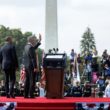Reform Fatigue—“Reform” has been the buzzword in Washington this winter. Anxious lawmakers reacted with alarm to lobbyist Jack Abramoff’s guilty plea. Something needed to be done to silence the public outcry—the sooner the better.
That something is turning out to be little more than nothing. Abramoff is temporarily off the front page. And every member of Congress or good government group seemingly has his or her own “reform” proposal—making it increasingly difficult to separate the good ideas from the bad.
Perhaps the best prescription came from Senator Barack Obama (D-IL), his party’s new point man on corruption issues, who proposed the creation of an independent agency designed to probe wrongdoing, beef up enforcement and reinvigorate the slumbering Ethics Committee, which hasn’t investigated a member since July 2002. “We can pass all the ethics reforms we want—gift bans, travel bans, lobbying restrictions—but none of them will make a significant difference if there isn’t a nonpartisan, independent office that will help us enforce those laws,” Obama said.
Typical freshman idealism. When Obama’s bill reached the Homeland Security and Governmental Affairs Committee, it went down 11-5. The far inferior legislation that cleared two separate Senate committees last week (to be considered by the full Senate as we go to press) simply forces lobbyists to file more “disclosure” paperwork, an approach Public Citizen’s Joan Claybrook likened to “tallying the number of people killed in highway crashes instead of making safer vehicles.” The excuses for voting against Obama’s bill ranged from ludicrous to downright insulting.
“I fear that the Ethics Committee will become little more than a paralyzed political body,” said the committee’s chairman, George Voinovich (R-OH), without a hint of irony. “Unfortunately, this can create the perception that the committee is inactive,” followed Hawaii’s Senator Daniel Akaka, one of three Democrats on the committee voting yea for Obama’s bill. Outside enforcement, said Senator Mark Dayton (D-MN), “[would have made] a statement [to voters] which I think is totally incorrect: that this body of 100 senators is so institutionally and individually corrupt that it cannot be trusted to police its own.” Imagine that.
Torch the Torture Laws—“President Nixon behaved as if he was above the law,” former Senator Gary Hart remarked recently. “The Bush Administration says it is.” Nowhere is this arrogance more evident than in the administration’s resistance to any and all laws prohibiting torture. The Bush White House bitterly opposed, from the first, Senator John McCain’s (R-AZ) push to regulate the treatment of prisoners in U.S. custody. When McCain’s bill passed in the Senate 90-9, Vice President Cheney sought an exemption for overseas CIA agents—the very people who have been torturing their captives at unspecified “black sites” around the world. After Bush signed the law with McCain by his side, he added a provision allowing the executive to waive the torture restrictions at any time.
Now the administration is arguing in court that McCain’s law doesn’t apply to foreign detainees at Guantánamo Bay who accuse the U.S. government of “systemic torture.” Detainees can only protest their “enemy combatant” status, the Justice Department maintains, not the cruel, inhuman or degrading treatment they endure. When Bush claims that torture is not U.S. policy, what he really means is that laws on torture do not stretch to places where the U.S. is actually torturing people.
Keeping Secrets—Just when it seems that this administration couldn’t get any more secretive, word comes that for the past seven years intelligence agencies have been combing through the National Archives, secretly reclassifying pages of already declassified material, a program that has intensified since 9/11. Some 55,000 pages of declassified writings have been made secret again since that date.
Naturally, the documents contain vital state secrets that, if re-disclosed, could seriously jeopardize U.S. security. Such as a 1948 memo detailing CIA plans to drop air balloons over countries behind the Iron Curtain—published in 1996 and reclassified in 2001. Or how the CIA predicted that Chinese intervention in the Korean War “was not probable”—two weeks before 300,000 Chinese troops poured over the Korean border. Or pressingly relevant reports “on Communism in Mexico in the 1960s and Treasury Department records from the 60s,” the New York Times reported. Luckily, the head of the National Archives is urging a declassification of the reclassified declassified materials.





0 Comments